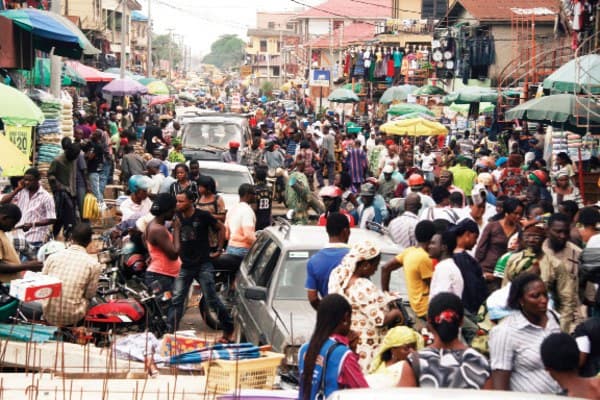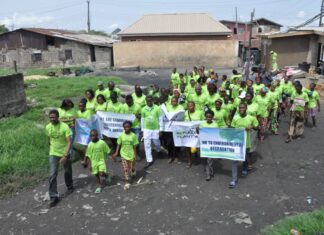By Valentine Amanze
Nigerians woke up Monday morning of December 30, 2019 to the reality that the Nigerian Customs Service in collaboration with other law enforcement agents raided the Yaba market in Lagos State, which specializes in selling used clothes popularly known as Okrika.
They broke warehouses and shops of traders, who were on Christmas break, and carted away trailer loads of clothing materials worth billions of naira in a midnight raid.
The raid was confirmed by the Customs spokesman, Joseph Attah, who spoke to the BBC.
Attah said that the raid was on information, insisting that goods they carted away were contraband and they had the right to confiscate them.
The Customs Coordinator, Western Zone, Assistant Comptroller General, Bukar Amajan, said that more than 4,800 bales of second-hand clothes were impounded from a single location – Yaba market.
Describing second-hand clothes as absolutely prohibited items, he challenged the owners of the consignment to come forward with any document to prove the goods were brought into the country legitimately.
A similar raid was carried out by the Customs in Mubi in Adamawa State early last December. Again, between October and November last year, the same government agency forced open many motor selling shops in Lagos State, while searching for illegally imported vehicles.
No doubt that the Customs has proved to be a money spinner for the Federal Government via seizures and revenue collection, but the modus operandi at times calls for concern.
Though one is not against the Yaba Market raid, the timing was suspicious.
The Customs waited till the wee hours to raid the market with armed officials, who could be mistaken to armed robbers.
Going by the time the raid was executed, how would one conclude that all the textile materials carted away were contraband? Who was there to take the inventory of the items taken away.
It is crystal clear that Nigerian law forbids the importation of second-hand clothes in the country, but it never out-lawed the sell of fairly used clothes in the country.
Many affluent Nigerians dispose of their new clothes after use – they do not wear their clothes after first use.
Such clothes get to the dealers, who sell them as okrika; but it is not always the case.
If armed robbers hit the same market the way and the manner the Customs did, how would Nigerians know the difference?
For transparency, subsequent raids be carried out in the day time.
Day time operations will enable the Customs officials identify the rightful owners of such illegal consignments and arresting them in the process.
The nocturnal raids also endanger the lives of the officials, who have families to care for. They could be attacked violently by any person.
Besides, the smuggled clothes passed through the country’s borders manned by the Customs officials and other security agencies in containers.
Where were the Customs officials when the smugglers bought in bales of okrika into the Yaba market? Did they compromise? What happens to the okrika materials after confiscation by the government officials? Won’t the materials find their ways back to the same market?
Truth be told there is high level corruption among government officials.
A trader once said that the same officials, who compromised to let the illegal clothes in are the ones raiding the warehouses and shops in Yaba. They know their customers.
But the frequent raid of the Yaba market may not stop the illegal business so long the textile industry remains comatose in Nigeria.
What happened to the Central Bank of Nigeria’s (CBN) plans to revive 20 textile companies in the country?
Nigerians were told in May last year that the CBN was planning to revive the companies before the end of 2019.
The apex bank said then that it had taken the first step in the journey to revive the sector with the flag-off of input distribution to 100,000 cotton farmers, as well as cultivating 100,000 hectares in 23 states of the federation.
It also inaugurated the Textile Revival Implementation Committee, which membership was drawn from the CBN, Nigeria Incentive-based Risk Sharing System for Agricultural Lending (NIRSAL), Kaduna State, Federal Ministry of Power, Works and Housing, Nigeria Customs Services, Federal Ministries of Finance and Agriculture and Rural Development, Ministry of Industry, Trade and Investment and Nigerian Export Promotion Council.
But it is the failure of federal government’s policies and promises that encourages illegalities in the country.
If the Nigerian government had followed its promises on the revival of the textile industries with action, the illegal booming okrika business would have become history aside providing employment for the teeming population.
Assuming that the textile companies in Nigeria are operational, will the paucity of electricity enable them to function maximally? Nigeria needs to get its power sector right before massive industrilation returns.
Besides, Customs officials must not sacrifice the nation’s security on the altar of revenue collection for the government. Its staff must have a new orientation on their job through regular workshops and seminars.
With this they will embrace the modern method of doing their job.
.
Valoa2000@yahoo.com
+2348054103455













